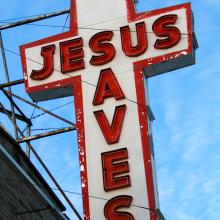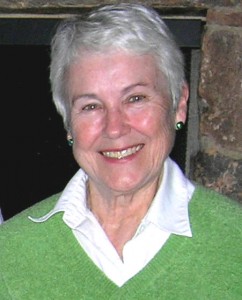How to deprogram followers of Trumpism and other extremist cults.
evangelical church
The prayer meeting kicked off the biggest cluster of COVID-19 in France — one of northern Europe's hardest-hit countries — to date, local government said. Around 2,500 confirmed cases have been linked to it.
I occupy a strange place between cultures. Not the international cultures of my childhood spent as a missionary kid living around the world, but between two sub-cultures here in modern America. I am a rare breed of evangelical that doesn’t live in a bubble of Christian culture. Quite the opposite. I live and work in higher education, and — mark it — secular higher ed.
An evangelical acquaintance once asked me delicately, “Is there a reason you and your husband don’t work at a Christian university?”
I could hear the gears in his head as he tried to reconcile what he saw before him: two highly educated, devout Christians working in the "liberal bastion" of a secular college. Why on earth would we do such a thing to ourselves?
The truth is, Dwayne and I live and thrive in the place we’ve carved out outside the bubble of American evangelicalism. It’s not that we don’t love the evangelical church, or don’t attend an evangelical congregation.
It’s just that we don’t identify with all aspects of the American version of evangelicalism.
He and I both came to know Jesus outside the States. We are both missionary kids. In addition, Dwayne is Canadian. As a result, we have an outsider’s perspective. For us, living in America and being evangelical poses an interesting paradox.
In so many ways, living and working with people who have vastly different life experiences than our own feels normal. After all, that’s how we grew up — in the company of friends whose worldviews are shaped by the submerged iceberg of cultures not our own. These differences don’t threaten our beliefs. Ironically, holding the space for the lived experiences of our friends creates an environment that also affirms our lived experiences, and more importantly, our faith.
There are few things as exhausting, draining, and disheartening as family drama. I’m not talking low-level sibling rivalry over who gets shotgun all the time. I’m talking deep-rooted family issues that go generations back. That kind of family drama shows up in the most inopportune times in the most inappropriate places — at someone’s wedding or funeral, at the family reunion, or while grocery shopping.
But when family drama shows up in the church, it grieves me. It riles me up like nothing else does because it is in my identity as a Christian and Jesus-follower where I am all of who God created me to be and has called me to be — Asian and American, Korean, female, friend, daughter, wife, mother, sister, aunt, writer, manager, advocate, activist. The church is the place where I and everyone else SHOULD be able to get real and raw and honest to work out the kinks and twists, to name the places of pain and hurt, and to find both healing and full restoration and redemption.
So when the church uses bits and pieces of “my” culture — the way my parents speak English (or the way majority culture people interpret the way my parents speak English) or the way I look (or the way the majority culture would reproduce what they think I look like) – for laughs and giggles, it’s not simply a weak attempt at humor. It’s wrong. It’s hurtful. It’s not honoring. It can start out as “an honest mistake” with “good intentions,” but ignored, it can lead to sin.
Fortunately, there is room for mistakes, apologies, dialogue, learning, and forgiveness.
More than 1,200 people have signed an online petition decrying the “silence” and “inattention” of evangelical leaders to sexual abuse in their churches.
The statement was prompted by recent child abuse allegations against Sovereign Grace Ministries, an umbrella group of 80 Reformed evangelical churches based in Louisville, Ky.
“Recent allegations of sexual abuse and cover-up within a well known international ministry and subsequent public statements by several evangelical leaders have angered and distressed many, both inside and outside of the Church,” reads the three-page statement spearheaded by GRACE (Godly Response to Abuse in the Christian Environment).
“These events expose the troubling reality that, far too often, the Church’s instincts are no different than from those of many other institutions, responding to such allegations by moving to protect her structures rather than her children.”
If justice is only an implication, it can easily become optional and, especially in privileged churches, non-existent. In the New Testament, conversion happens in two movements: Repentance and following. Belief and obedience. Salvation and justice. Faith and discipleship.
Atonement-only theology and its churches are in most serious jeopardy of missing the vision of justice at the heart of the kingdom of God. The atonement-only gospel is simply too small, too narrow, too bifurcated, and ultimately too private.
The Christian world is broad and spacious, and within its circumference, like a large bowl holding a variety of colorful fish, swim a surprisingly diverse spectrum of believers. The secular media mistakenly seem to view "the evangelical movement" as a sort of monolithic structure akin to a well fortified garrison ranged to repel the attacks of "liberals" or "progressives" or "mainline churches." Or a right-wing political force often equated with Republicanism.
Here we go again. Presidential elections are coming and the role of "the evangelicals" is predictably becoming a hot political story.
Ironically, voices on both the right and the left want to describe most or all evangelicals as zealous members of the ultra-conservative political base.
Why? Perhaps because some conservative Republicans want to claim a religious legitimacy and constituency for their ideological agenda, and some liberal writers seem hell-bent on portraying religious people as intellectually-flawed right-wing crazies with dangerous plans for the country.
Let me try to be clear as someone who is part of a faith community that is, once again, being misrepresented, manipulated, and maligned. Most people believe me to be a progressive political voice in America. And I am an evangelical Christian.
I believe in one God, the centrality and Lordship of God's son Jesus Christ, the power of the Holy Spirit, the authority of the scriptures, the saving death of the crucified Christ and his bodily resurrection -- not as a metaphor but a historical event. Yep, the whole nine yards.
Earlier this summer I attended a church service where the pastor, a man struggling with what appears to be his final bout with cancer, preached about the hope that Jesus promises to those who trust in him. After describing the returning Jesus brandishing a sword and dripping with the blood of all our vanquished enemies, he invited the audience to share what they saw as the hope that this Jesus promises. The responses ranged from no cancer, to no pain, to no worries about paying the bills, to the promise of an upgraded body -- all of course in heaven someday after we die. The congregation was encouraged to find contentment in the present from the possibility of realizing these promises someday. Our souls are what matter; the body just has to endure until our souls reach heaven. No mention of help with how to pay this month's rent or what it means for a cancer-ridden body to be the temple of the Holy Spirit, just the spiritual promise that someday all will be well.
Shakespeare said a rose by any other name would smell as sweet. Maybe, but a Stink Rose by any other name (say... garlic?) might get more play.
On July 19, Campus Crusade for Christ announced its plan to officially change its name to Cru in early 2012.
Brown v. Board of Education had not yet been fought in the Supreme Court when Bill and Vonetta Bright christened their evangelical campus-based ministry Campus Crusade for Christ in 1951. The evangelical church context was overwhelmingly white, middle class, and suburban. The nation and the church had not yet been pressed to look its racist past and present in the face. The world had not yet been rocked by the international fall of colonialism, the rise of the Civil Rights movement, the disillusionment of the Vietnam War, the burnt bras of the women's liberation movement, the fall of the Berlin Wall, or the rise of the Black middle class (more African Americans now live in the suburbs than in inner cities). In short, theirs was not the world we live in today. So, the name Campus Crusade for Christ smelled sweet. Over the past 20 years, though, it has become a Stink Rose ... warding off many who might otherwise have come near.
A recent U.S. Court of Appeals ruling, and the subsequent fallout here in New York, hits close to home for many of us New Yorkers. The ruling, which came down on June 2, allows for the city of New York to restrict religious groups from meeting in schools
It was five days before the mid-term elections. The race to fill President Obama's senate seat was neck-and-neck. On one side, Alexi Giannoulias strongly supported comprehensive immigration reform and the DREAM Act.






